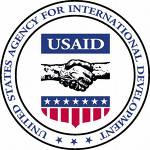 At least $52 million annually for fiscal years 2006 and 2007 will be provided to the Democratic Republic of the Congo (DRC) under legislation signed December 22 by President Bush. These funds are intended to enhance the United States' and international organizations' efforts to fight political, social and economic challenges facing the African nation.
At least $52 million annually for fiscal years 2006 and 2007 will be provided to the Democratic Republic of the Congo (DRC) under legislation signed December 22 by President Bush. These funds are intended to enhance the United States' and international organizations' efforts to fight political, social and economic challenges facing the African nation.
The act provides for bilateral assistance programs and establishes U.S. political, social, civil and economic policy objectives for the DRC, a country that earlier in 2006 held its first fully democratic election since 1960. (See related article.)
Recent conflicts in the nation have resulted in 4 million dead, 800,000 refugees scattered throughout nine neighboring countries and the collapse of state services.
The act states that the United States should work with international partners to encourage other nations to increase their contributions to the DRC. International donors, led primarily by the United Nations and the European Union, were active in the DRC in the months leading up to the election by providing aid, funds and peacekeeping support to the nation. For the DRC to continue to make progress, the international community must maintain its support, experts on the region said in a panel discussion at the Brookings Institution in Washington December 18. (See related article.)
The government of the DRC must be committed to achieving the policy objectives outlined by the United States and other international donors, the act states. The act allows the U.S. secretary of state to withhold assistance if the government of the DRC does not make sufficient progress toward accomplishing these objectives.
The act also recommends that the U.S. president appoint a special envoy for Africa's Great Lakes region to help improve stability and security in that region of Africa.
U.S. AID HELPS IMPROVE DRC'S ECONOMY, democratic institutions
The act also will provide funds that could complement current U.S. projects to improve health care, agriculture, democratic institutions and education in the DRC.
The United States Agency for International Development (USAID) currently provides key health services in the country, including malaria treatments, routine vaccinations and HIV/AIDS prevention and care. It also supports a program to help farmers grow more and better crops, and distributes improved seeds. As part of this program, USAID has assisted 50,000 farmers in growing cassava, a staple crop in the DRC.
In addition, USAID trains Congolese teachers and helps to encourage and assist girls' education by providing scholarships. The agency also has trained local communities in how to repair roads destroyed in conflicts. (See related article.)
Leading up to the election, the United States helped establish democratic institutions, new political laws and electoral guidelines and structures. It continues to help the nation maintain its democratic institutions.
Related articles
- • European Union Sanctions Rwanda and M23 Officials over Congo Conflict (March 17, 2025)
- • Canada and Germany Impose Sanctions on Rwanda for Supporting M23 Rebels (March 4, 2025)
- • European Union Suspends Defence Consultations with Rwanda (February 24, 2025)
- • Denis Mukwege Wins Sakharov Prize 2014 (October 21, 2014)
- • New DR Congo amnesty law welcomed by UN envoys (February 5, 2014)
- • Congo Army Takes Control of Mbuzi Hill From M23 Rebels (November 4, 2013)
- • UN Security Council debate focuses on peace efforts for Africa's Great Lakes region (July 25, 2013)
- • At high-level meeting, Ban urges political solution to crisis in eastern DR Congo (September 27, 2012)
- • Tshisekedi Says He Won, Can He Prove It? (December 17, 2011)
- • European Union to observe presidential and legislative elections (October 19, 2011)
- • EU, DR Congo Sign Elections Funding Agreement (June 25, 2011)
- • Congo Celebrates 50th Anniversary of Independence (June 30, 2010)
- • Southern African countries move to single visa zone (February 26, 2010)
- • Southern African Ministers Prepare Report on Regional Crises (January 7, 2010)
- • Human Rights Watch Calls on FDLR Rebels in Eastern Congo to Investigate Themselves (December 15, 2009)
- • Madagascar President Prevented from Taking Floor at UN General Assembly (September 25, 2009)
- • Diplomatic Activity Builds to Halt Eastern Congo Clashes (January 8, 2009)
- • Opinion: Solving the Kivu Equation (December 24, 2008)
- • Human Rights Watch Details Summary Executions in DRC (December 12, 2008)
- • Human Rights Watch: 150 people killed in Kiwanja as UN force stood by (December 11, 2008)
- • Human Rights Council adopts resolution on human rights in eastern Congo (December 1, 2008)
- • Human Rights Watch: Increase Peacekeepers in Eastern Congo (November 11, 2008)
- • Human Rights Watch Accuses Congo Rebels of Killing Civilians (November 7, 2008)
- • For an effective and credible MONUC (September 28, 2008)
- • North Kivu : President Kabila receives the international community in Goma (September 15, 2008)
- • Alarm-bells ring at upsurge in fighting (September 8, 2008)
- • France contributes one million euros to support the electoral process in the DRC (August 28, 2008)
- • Congo groups 're-arming' in east (August 1, 2008)
- • Human Rights Watch: Peace Accord Fails to End Killing of Civilians (July 21, 2008)
- • LRA regional atrocities demand action (May 19, 2008)







